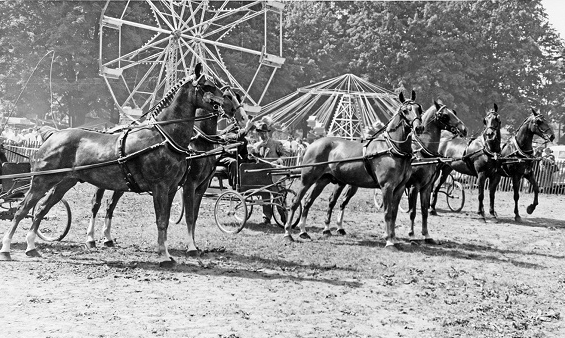For more than 80 years, the Aurora Horse Show was a staple on Aurora’s calendar.
Although it came to an end in 2006, the memories endure for generations of residents.
And that’s where the Aurora Museum & Archives comes in.
Ahead of the 100th anniversary of the founding of the Aurora Horse Show in 1922, the local museum is asking residents to contribute their photographs, artifacts and, perhaps most importantly, their memories to make the anniversary one for the books.
A publication is just one of the many initiatives the museum has planned to mark the occasion, but there are some gaps that those who attended in years past will be instrumental in filling.
“The horse show was a big deal in Aurora,” says Shawna White, curator of the Aurora Museum and Archives, of the event that has its roots as a privately run event in 1922.
It wasn’t until the following year, however, that the horse show began taking shape as an attraction for all Aurorans, first at Town Park and, come the 1970s, the more spacious Machell Park.
“You look at Town Park now and can’t believe there was a horse show and a midway,” says White. “It is part of the memory of everybody who grew up in Aurora. It was something you looked forward to. It was fabulous. What better way to celebrate it than doing a publication – a nice book with lots of photographs, the whole history of it. What we’re wanting now is to reach out to the community members who have memories of it. Maybe they were involved in it, maybe they can tell us that story before it is gone. As we get further afield and more generations come in, it will be gone.”
The Aurora Museum and Archives is brimming over with artifacts and photos from horse show events from the 1940s and '50s, but tangible mementos and memories are scarce in later decades. In fact, there is little to nothing to serve as a legacy for events from the 1970s through to its demise in the first decade of the new millennium.
“It is one of those things where everybody went to it, everybody knows about it, but nobody bothers to save it,” says Ms. White. “We need programs, we need posters, we need photographs. If anyone took home movies there or did anything like that, we would love to see that just so we can tell the story. There are these amazing things that happened in Town Park, but who were the people and what did they do? Where else did they compete? We know the famous ones, but we don’t have these individual ones and the memory of what the show meant to the community.”
Beyond the centenary of the horse show next year, part of the museum’s strategy is collecting the history of today, the things that people will want to see 100 years from now. They want to bring together the lived experiences of Aurorans as they are living it, says White, and that includes the mementos you might be squirreling away in boxes to look at another day – even if it is 50 years from now.
One such initiative the museum has begun preserving for generations to come is the Solidarity March that took place in Aurora last spring in conjunction with the murder of George Floyd and the Black Lives Matter movement.
“We reached out to organizers to get some of those things to put in the archives because they can tell that story,” says White. “We’re asking people to tell us these stories so we’re not putting words in their mouth. They will tell us how they felt about it, how it came about, so people 50 to 100 years from now aren’t making assumptions and drawing conclusions. We are very much trying to capture things as they happen and being able to talk to people who are doing it to get their thoughts about things that are happening.
“We also have the ongoing Documenting the Pandemic project asking people, whether they are making a diary or pictures, we want that content.”
To share your memories or artifacts with the Aurora Museum & Archives, contact curator Shawna White at [email protected].
Brock Weir is a federally funded Local Journalism Initiative reporter at The Auroran
